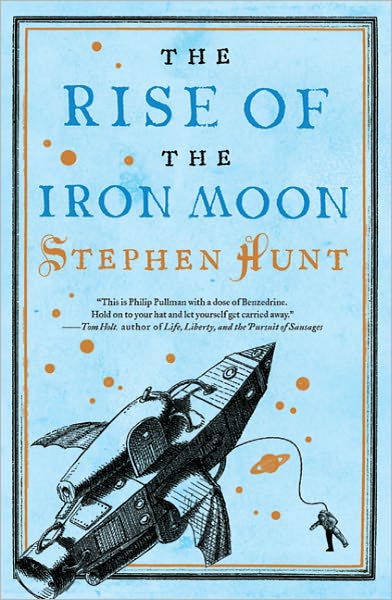
 Stephen Hunt introduced readers to the Kingdom of Jackals with The Court of the Air (Tor, 2008), a steampunk adventure with not one but two orphans thrust into heroism: Molly Templar, the last in a bloodline capable of controlling the ancient god-like Hexmachina, and Oliver Brooks, a half-human, half-fey lad forced on the lam after his uncle stumbles onto a massive conspiracy and is assassinated. That novel culminated with an epic battle against the Commonshare--imagine a 19th-century cyborg version of the Khmer Rouge, with Kurt Vonnegut's "Harrison Bergeron" as a guiding principle--and it's hard to imagine how Hunt could top that for excitement. 2009's The Kingdom Beyond the Waves, also set in the world of Jackals but with a mostly different cast of characters, was highly entertaining but not quite as exciting overall. But The Rise of the Iron Moon successfully ups the stakes, offering a fast-paced remix of The War of the Worlds.
Stephen Hunt introduced readers to the Kingdom of Jackals with The Court of the Air (Tor, 2008), a steampunk adventure with not one but two orphans thrust into heroism: Molly Templar, the last in a bloodline capable of controlling the ancient god-like Hexmachina, and Oliver Brooks, a half-human, half-fey lad forced on the lam after his uncle stumbles onto a massive conspiracy and is assassinated. That novel culminated with an epic battle against the Commonshare--imagine a 19th-century cyborg version of the Khmer Rouge, with Kurt Vonnegut's "Harrison Bergeron" as a guiding principle--and it's hard to imagine how Hunt could top that for excitement. 2009's The Kingdom Beyond the Waves, also set in the world of Jackals but with a mostly different cast of characters, was highly entertaining but not quite as exciting overall. But The Rise of the Iron Moon successfully ups the stakes, offering a fast-paced remix of The War of the Worlds.
In the years since Jackals defeated the Commonshare, Molly has become a celebrated author of "celestial fiction," while Oliver fights evil as Hood-'o-the-Marsh, a Shadow-like vigilante wielding a pair of magical guns. (Hunt's pulp influences are many; that he's able to blend them into a diversified but internally consistent world is a testament to his literary skill.) Molly's astronomer friend, the steamman Aliquot Coppertracks, believes he has discovered evidence of life on the neighboring planet of Kaliban, and a strange blue man soon comes to warn them that it's true... and the invasion force is already on its way. But the surprise visitor also brought with him another orphan: Purity Drake, an escapee from Jackals' Royal Breeding House who possesses a power a full order of magnitude higher than Molly or Oliver's.
The counterattack against Kaliban's "Army of Shadows" is fought on two fronts: Molly commandeers a spaceship and leads the motley crew on board during the unexpected launch to the aggressor planet to rendezvous with the rebel underground, while Oliver guards Purity as she flees across Jackals, taking faltering steps toward her destiny. Once the battle is fully engaged, Hunt rarely gives readers opportunity to catch their breath. Certain aspects of his "ripping yarns" pastiche voice work better than others; the deliberately cornball brogue of Commodore Black, for example, may prove grating to some readers' ears. (Yet he must be one of Hunt's favorite creations, for he features prominently in all three Jackelian stories.) And, yes, you've seen many of these tricks before (and what is it with Hunt and orphans?), but the sleight of hand is so expert that these familiar emotional manipulations might still affect you as if you're reading them for the first time. Now it's really hard to see how he's going to top himself in the next novel.--Ron Hogan
Shelf Talker: Readers expecting finely tuned realism may find Hunt's stylistic fidelity to his 19th-century inspirations cartoonish, but fans of authors like Cherie Priest (Boneshaker) or Scott Westerfield (Leviathan) can find much to enjoy.

